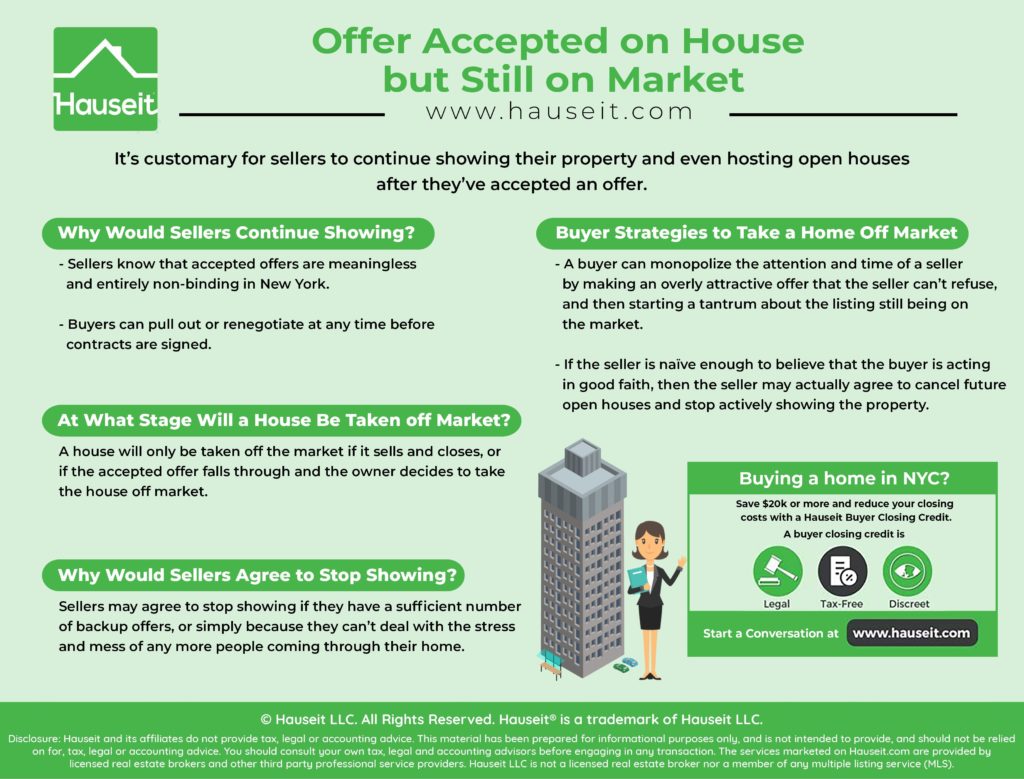It’s customary for sellers to continue showing their property and even hosting open houses after they’ve accepted an offer.
In fact, it’s standard practice for sellers to continue showing their home until contracts have been signed in NYC. So don’t be surprised if you have an offer accepted on a house but it’s still on the market!
Table of Contents:

Informed sellers understand that accepted offers are quite meaningless in New York. In fact, real estate offers are not binding in New York, whether they were submitted verbally or in writing.
Buyers can pull out or renegotiate at any time before contracts are signed.
Similarly, sellers can pull out of an accepted offer, sell to someone else or take the house off market at any time before they counter-sign a contract.
As a result, only a very naive seller would agree to take his or her house off the market as soon as there’s an accepted offer.
Doing can waste precious weeks of time on the market if the buyer falls through, and if the buyer decides to renegotiate after weeks of hemming and hawing, the seller is in a weaker position given all of the time wasted.
As a result, don’t be alarmed if you have an offer accepted on a house but it’s still on the market. The seller isn’t doing it maliciously, and the seller may not even be actively shopping your offer.
The seller is just being a responsible individual and realizing that your offer doesn’t mean anything until you sign a contract and hand over an earnest money check!
Get a 2% Rebate When You Buy
Save thousands on your home purchase with a buyer agent commission rebate from Hauseit
A house will only be taken off the market if it sells and closes, or if the accepted offer falls through and the owner decides to take the house off market.
The listing agent will not just take his or her listing off the market because you have an accepted offer. That’s not how it works!
For starters, many MLS associations have strict rules on listing status updates, and listing agents must accurately update their listing’s status in a timely manner, often within 24 hours.
As a result, a listing agent may not be able to just take it off the market because you have an accepted offer, even if the listing agent wished to comply.
Furthermore, it’s entirely abnormal and overly demanding of a request to have a listing be taken off market just because you have an accepted offer.
It’s against the seller’s interests to do so, as an accepted offer is rather meaningless until contracts have been signed.
Even if an accepted offer becomes a signed contract, a listing agent will still refuse to take the property off market.
It’s an entirely unreasonable ask because once a property is in contract, there’s a binding deal and the seller can’t just arbitrarily sell it to someone else.
As a result, the only effect of taking a listing off market at this stage would be to hurt the listing agent’s statistics and deal history.
Don’t insult the listing agent by making an unreasonable request like this!
Save 2% On Your Home Purchase
Save thousands on your home purchase with a buyer agent commission rebate from Hauseit
Sellers may agree to stop showing if they have a sufficient number of backup offers, or simply because they can’t deal with the stress and mess of any more people coming through their house.
In rare instances, a seller may actually agree to cancel future open houses or even any further showings for a strong accepted offer.
However, this will typically only happen if a listing is very stale and has been on the market for 100 days or more.
At this point, the seller may be desperate and may agree to anything, including possibly even making repairs to the property before closing.
In even rarer instances, we’ve seen sellers agree to stop further showings for an accepted offer, primarily because the seller refused to listen to his or her listing agent and naively didn’t want to get anyone else’s hopes up of getting their dream home.
Needless to say, this is a very dangerous route for the seller as we’ve seen too many instances of an outstretched bidder who has an accepted offer take weeks for the contract review and due diligence period.
The buyer will invariably try to re-negotiate or back out, and the seller will finally realize what a stupid move he or she made after having wasted weeks of precious time on the market.
When the seller tries to go back to market, many of the formerly interested buyers will have disappeared or gotten accepted offers on other properties already.
Losing other potential buyers like this can be catastrophic for listings that aren’t insanely popular with plenty of interested buyers to go around.
A common buyer strategy to monopolize the attention and time of a seller is to make an overly attractive offer that the seller can’t refuse, and to start a tantrum about the listing still being on the market.
If the seller is naive enough to believe that the buyer is acting in good faith, then the seller may actually agree to cancel future open houses and stop actively showing the property.
Unfortunately for the seller, this puts the sneaky buyer in prime position as the sole potential buyer with a head start on due diligence.
After many days or even weeks of due diligence, essentially as long as the buyer thinks the seller will tolerate, the buyer will finally reveal that he or she found some issues with the property and is having second thoughts.
In fact, negotiating after home inspection is a well-known tactic used by buyers against unwitting sellers who don’t understand that offers aren’t binding at all.
The seller will be understandably upset that the buyer wants to re-negotiate the price, especially after all of the time the seller has exclusively dedicated to the buyer.
The seller may continue showing the property again, but is in a weaker position as most of a listing’s traffic is during the first few weeks on market.
Furthermore, other interested buyers may have long disappeared, and the seller may be left with only the sneaky buyer to deal with.
Furthermore, the sneaky buyer legitimately has a long head start on due diligence, and may even be ready to sign. As a result, the seller oftentimes may simply agree to a concession and do the deal with the buyer.
A Full Service Listing for 1%
Sell your home with a traditional full service listing for just one percent commission.
Disclosure: Commissions are not set by law or any Realtor® association or MLS and are fully negotiable. No representation, guarantee or warranty of any kind is made regarding the completeness or accuracy of information provided. Square footage numbers are only estimates and should be independently verified. No legal, tax, financial or accounting advice provided.






